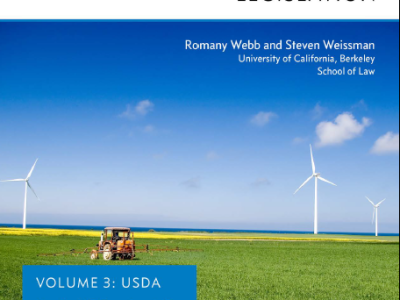biomass
U.S. Agricultural Policy, Climate Change, and Existing Legal Authority
New research from Berkeley Law finds that the U.S. Department of Agriculture can act now to reduce greenhouse gas emissions
The U.S. Department of Agriculture (USDA) is much in the news these days, as it implements the massive and always-controversial farm bill, works to improve access to national forests, strives to enhance the U.S. position in international agriculture markets, and wrestles to contain this season’s extensive wildfire activity. What is less obvious to many is …
Continue reading “U.S. Agricultural Policy, Climate Change, and Existing Legal Authority”
CONTINUE READINGClearing Up the Standing Mystery in the Biomass Case
In a post last week, I expressed puzzlement about the D.C. Circuit’s failure to discuss standing in Center on Biological Diversity v. EPA, which involved EPA’s decision to delay greenhouse gas regulations for facilities burning biomass. The question of standing in climate change cases has been controversial, so this mystery sparked extensive discussion among environmental …
Continue reading “Clearing Up the Standing Mystery in the Biomass Case”
CONTINUE READINGWaste Not, Want Not
In trying to catch up on my reading, I discovered that the August 10 issue of the journal Science has a special section on “working with waste.” The theme is the ability of waste to contribute to society as a form of energy or raw materials: [T]rash is often treasure— a feedstock that cannot be …
Continue reading “Waste Not, Want Not”
CONTINUE READINGExploring Policies to Promote Local Renewables
Last July, California Governor Jerry Brown held a conference, hosted by the Luskin Center at UCLA, to launch his initiative to achieve 12,000 megawatts of local renewable energy projects in California by 2020. Local renewables, often called distributed generation, are projects no larger than 20 megawatts located close to customer demand. Berkeley Law’s Center for …
Continue reading “Exploring Policies to Promote Local Renewables”
CONTINUE READINGChocolate Coated Coal?
The Associated Press reports that Lindt USA (that’s right, the chocolate company) and Public Service of New Hampshire (PSNH) served up a new form of fuel on Tuesday when they mixed 18 tons of crushed cocoa bean shells with 600 tons of coal to power an electric power plant. The shells are a byproduct of chocolate production, …
Continue reading “Chocolate Coated Coal?”
CONTINUE READING




